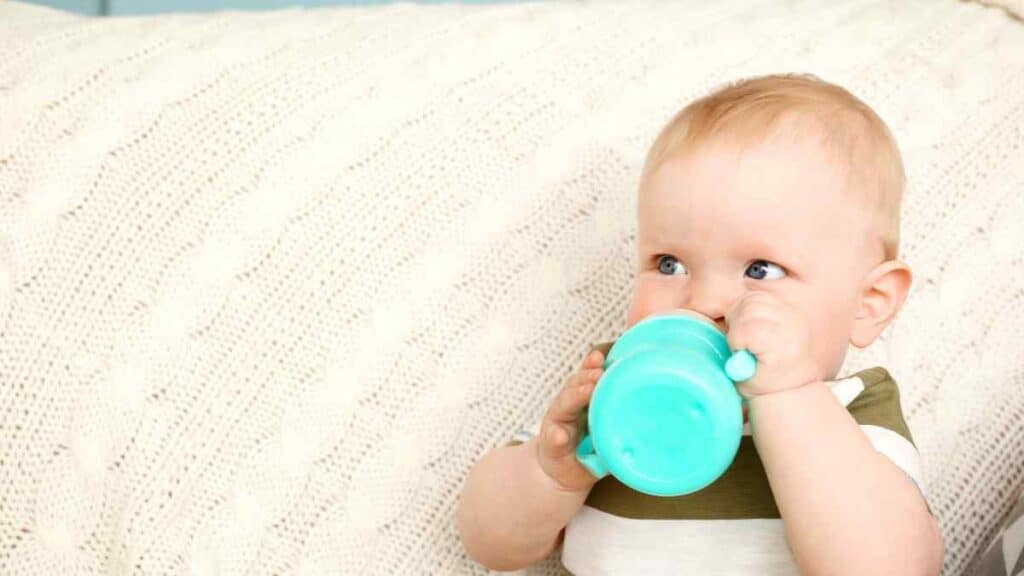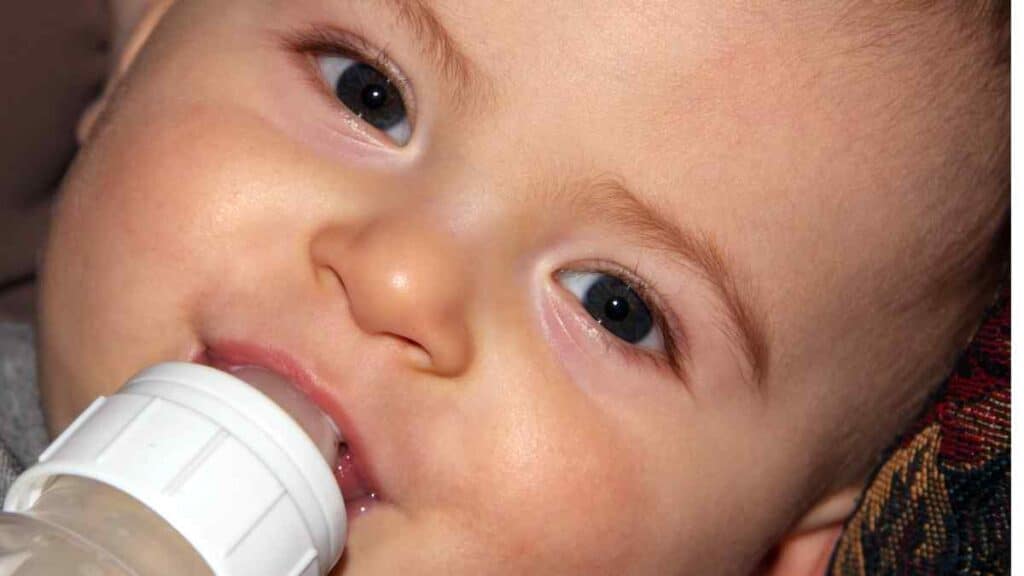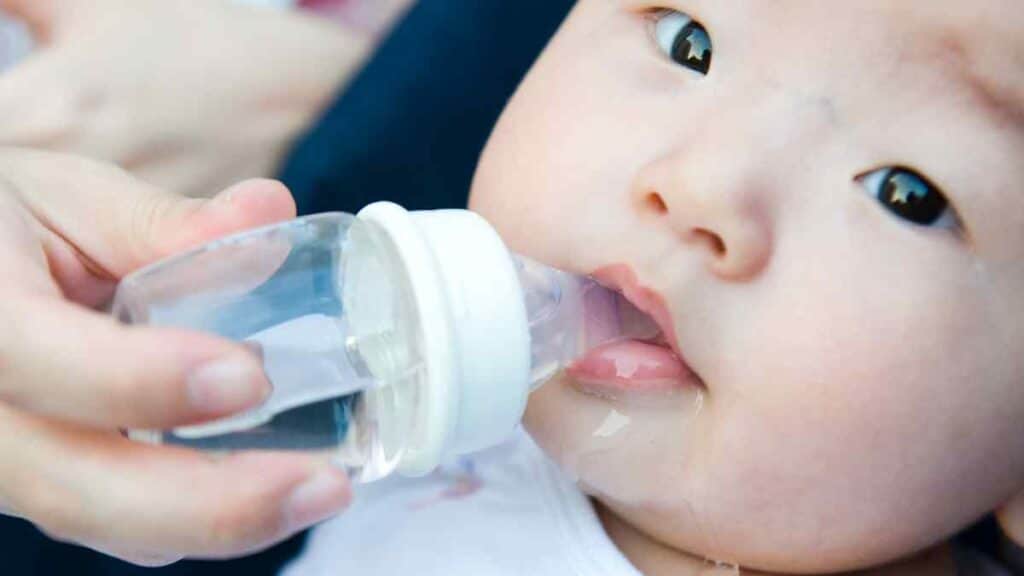As new parents, ensuring the well-being and health of your newborn is a top priority. One aspect of infant care frequently surrounded by questions and concerns is hydration. You may wonder when giving your baby water is safe or how to navigate the transition from a solely milk-based diet. This article aims to clear the air and provide the information you need to make confident decisions about your child’s hydration needs.
We will delve into the importance of hydration for newborns, discuss the potential risks of giving water too early, and provide a comprehensive guide to safely introducing water to your baby’s diet. By the end of this article, you’ll have the knowledge and understanding to make informed choices about your newborn’s hydration, ensuring their health and happiness throughout their early developmental stages. So let’s dive in and explore the fascinating world of infant hydration together.

How Infants Stay Hydrated
As parents, keeping our little ones healthy and well-hydrated is paramount. But when it comes to infants, understanding how to maintain proper hydration can be a challenge. Let’s discuss the various stages of an infant’s hydration journey, from breast milk or formula to drinking water, and the best practices for each stage.
Initially, all the hydration a newborn needs come from either breast milk or formula. For most babies, offering additional water during the first few months of life is unnecessary, as breast milk or formula provides them with adequate fluids and nutrients. However, as babies grow and begin to eat solids, it becomes essential to introduce water into their daily routine.
Introducing small amounts of plain water to your baby’s diet around six months of age is generally safe as they start eating solid foods [1]. To do this, you can use an open cup or a sippy cup to offer a few sips of water with meals. Remember, the primary goal is to establish a healthy habit of drinking water rather than to replace breast milk or infant formula in their diet.
While tap water is typically safe for babies to drink, it’s essential to consider the quality of your local water supply. If you are still determining the water quality, using a filtration system or bottled water can be a good alternative. When mixing formula, always follow the manufacturer’s instructions, and avoid the urge to dilute the formula, as it can lead to inadequate nutrient intake for your baby.
As your child grows, their water intake will increase, but it’s important not to give them too much water. Excessive water consumption can lead to a rare but serious condition called water intoxication. To prevent this, monitor your baby’s water intake and continue to offer breast milk or formula as the primary source of hydration.
It’s essential to avoid giving infants energy drinks, as they can be harmful to their developing bodies. Instead, if your baby is experiencing dehydration, consider offering an electrolyte solution specially formulated for infants. Maintaining proper hydration is crucial for your baby’s overall health, and it helps prevent issues like tooth decay and constipation.

How Much Water Does My Baby Need?
As we have delved into the intricacies of how infants stay hydrated, we have explored how crucial it is for babies to maintain their fluid levels and the primary source for infants to stay hydrated – breast milk or formula. Today, we will discuss the specifics of how much water a baby needs, depending on their age and feeding habits.
Breast milk and formula are the main sources of hydration for babies, especially during the first six months of their lives. These milk sources are nutritionally complete and contain all the water and nutrients your little one needs to grow and develop. But, as your baby grows older, you may find yourself wondering, “How much water should my baby drink, and when should babies start to drink water?”
As a general guideline, babies should be introduced to small amounts of water once they start consuming solid foods, usually around six months of age. Until then, breast milk or formula should suffice to keep your baby hydrated. It’s important to note that offering water too early could cause your baby to consume less breast milk or formula, potentially leading to malnutrition and reduced growth.
When your baby begins to eat solid foods, you can offer sips of water to help them get accustomed to drinking from a cup. The water will not only keep your baby hydrated but also help them transition from breast milk or formula to other fluids. It’s best to use tap water that has been boiled and cooled or filtered water that is free from contaminants.
At this stage, be cautious about giving too much water, as excessive consumption can lead to water intoxication. This rare but dangerous condition occurs when a baby drinks so much water that it dilutes the sodium levels in their blood, potentially leading to seizures, coma, or even death. To avoid water intoxication, ensure that your baby’s intake of water does not exceed the recommended amounts based on their age and body weight.
As your baby grows, their need for water will gradually increase. By the time they reach one year of age, they will require more water to stay hydrated, in addition to breast milk, formula, or cow’s milk. The specific amount of water your child needs will depend on factors like their age, activity level, and the climate in which they live.
To ensure that your baby gets enough fluids, keep a close eye on the number of wet diapers they produce each day. A well-hydrated baby will typically have six or more wet diapers in a 24-hour period. Other signs of proper hydration include having a moist mouth, tears when crying, and good skin elasticity.

Making Sure Water Is Baby-Safe
Previously, we discussed the importance of water for your baby and how much they need as they grow. We also touched on the significance of using clean, safe water when offering it to your little one. Today, we will explore how to ensure that the water you provide to your baby is safe and appropriate for consumption in a comprehensive list format.
Age-appropriate water introduction
As discussed in the previous column, babies should start drinking water around six months of age, when they begin consuming solid foods. Until then, breastmilk or formula should provide adequate hydration. Introducing water too early may lead to less breastmilk or formula intake, which can impact growth and nutrition.
Boil and cool tap water
For babies younger than six months, if you need to mix formula, it is crucial to use tap water that has been boiled and cooled to ensure it is free of contaminants. This is especially important if you live in an area with poor water quality or are unsure of the water’s safety.
Filtered water
For babies older than six months, you can use filtered water for drinking and mixing formula. Ensure that the filter you use is certified to remove common contaminants found in tap water, such as lead, chlorine, and bacteria.
Avoid mineral and distilled water
When making baby formula, avoid using mineral water or distilled water, as these can have high mineral content or lack essential minerals, respectively. This imbalance may affect the electrolyte balance in your baby’s body, which can harm their health.
Dilute formula correctly
Always follow the manufacturer’s instructions for mixing formula to ensure that you dilute it correctly. Over-diluting or under-diluting the formula can lead to inadequate nutrition or digestive issues for your baby.
Safe water storage
Store your baby’s drinking water in a clean, airtight container, and keep it in a cool, dark place. Be sure to replace the stored water regularly to ensure its freshness and safety
Transition to tap water
After your baby’s first birthday, you can gradually transition them to regular tap water, provided it is deemed safe to drink. You can check the water quality report in your area or consult your pediatrician for guidance.
Monitor hydration
Keep a close eye on your baby’s hydration levels by monitoring the number of wet diapers, checking for moist mouths and tears when crying, and observing their skin elasticity. These indicators will help you determine if your baby is receiving enough water in addition to breastmilk or formula.

Risks of Water for Infants
While it is essential for your baby to stay hydrated, offering water too early or in excessive amounts can pose risks to your little one’s health. Today, we will delve into the potential dangers associated with improper water consumption for infants.
- Nutrient deficiency: Giving your baby water too early, before they reach six months of age, can interfere with their nutrient intake. Consuming too much water may fill their tiny stomachs, leaving less room for breastmilk or formula that provides essential nutrients for growth and development.
- Water intoxication: As we have mentioned before, drinking excessive amounts of water can be dangerous for your baby. Water intoxication occurs when the balance of electrolytes in the body is disrupted, leading to symptoms such as swelling, seizures, and even coma. To avoid this, limit the amount of water you give your baby based on their age and body weight.
- Dilution of electrolytes: When babies drink water, especially in larger quantities, it can dilute the concentration of electrolytes in their blood. This imbalance can result in lethargy, irritability, and even more severe complications like seizures or brain damage.
- Diarrhea and dehydration: Giving your baby too much water, juice, or other liquids can cause diarrhea, leading to dehydration. To prevent this, offer smaller amounts of water or juice and focus on providing breastmilk or formula as their primary source of hydration.
- Contaminated water: If the water you provide to your child is not adequately treated or filtered, it may contain harmful bacteria, viruses, or chemicals that can make them sick. Always ensure that the water you give your baby is clean and safe to drink.
To mitigate these risks and keep your baby safe, follow these guidelines for offering water to your little one:
- Wait until your baby is around six months old and has started eating solid foods before introducing small sips of water.
- Offer your baby small amounts of water in a cup, rather than a bottle, to help them learn to drink from a cup and limit their water intake.
- As your child grows older, the amount of water they consume gradually increases. Toddlers should generally drink around 1 to 1.5 ounces of water per pound of body weight each day.
- If your baby is sick or experiencing diarrhea, consult your pediatrician for guidance on how much water and electrolytes they need to stay hydrated.
Conclusion
In conclusion, navigating newborn hydration can be a challenging yet essential aspect of parenting. Understanding when and how to introduce water to your baby is crucial for their health and development. By waiting until your little one is around six months old and has started eating solid foods, you can safely begin offering small amounts of water while providing breastmilk or formula as their primary source of hydration.
As your baby grows, monitor their water intake and adjust it according to age, activity level, and overall health. By staying informed and vigilant, you can confidently guide your baby through the early stages of hydration and ensure their well-being as they grow and thrive.
We hope this article was helpful. If you have a question about anything you’ve read here, let us know in the comments!



